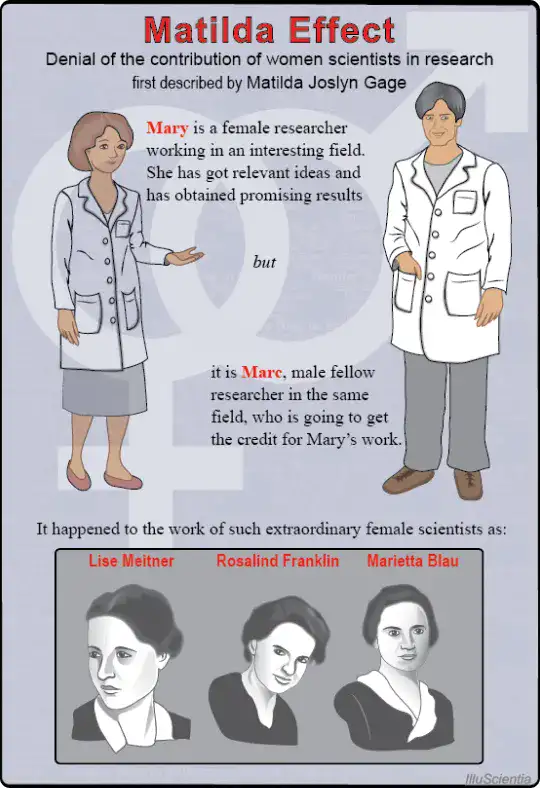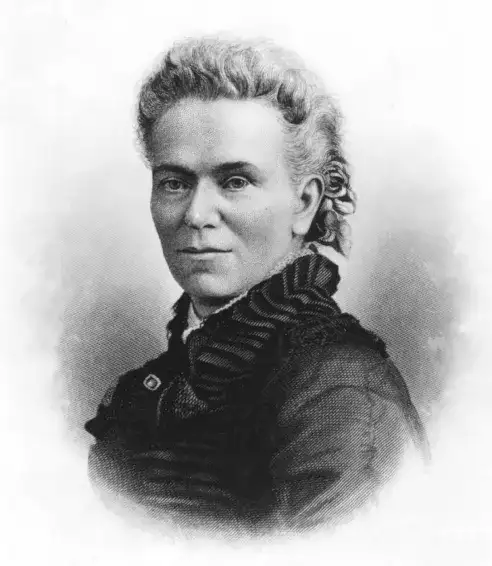THE MATILDA EFFECT

In the scientific field, the question of "to whom should return the merit of such or such a find ”comes back regularly, but remains essential. A scientist who gets credit as the author of a important discovery, may see its notoriety explode and its status change for the better. But conversely, a researcher only mentioned in thank you page, despite the hard work he has provided, will be forgotten. The progression of his career in will then be greatly slowed down.
A phenomenon of inequalities
This quick explanation allows us to introduce the Matilda effect, which is the minimization of women's contribution scientists for the benefit of their colleagues male.

This phenomenon is fully described and detailed in the 80s, by the scientist and feminist Margaret Rossiter, who is based on even on the work of several researchers.

She first resumes the studies of the sociologist
Robert King Merton.
The latter understands that some scientists
enjoy fame at the expense of
their relatives, who nevertheless participated in
project and therefore the creation of this same
fame.
In the 1960s, he established the "effect
Mathieu ”, theory on inequitable distribution
of glory.
Rossiter realizes that the phenomenon
mentioned by Merton is all the more amplified
when the relatives in question are
women.
She then names this find
"Matilda effect", in homage to the feminist and
abolitionist Matlida Joslyn Gage.
In her essay "Woman as an Inventor", published
for the first time in 1870, the latter
had already noticed in his time that the thought
intellectual women was too often
monopolized by men.

Worrying cases
You should know that the Matilda effect is a
phenomenon very present in the field
scientific, regardless of the facet.
On the IT side, for example, a statistic
frightening tells us that in 1970, 59% of
women are programmers in projects
but only 7% are recognized as
authors.
Several examples support this statistic.
Take the case of Jennifer Smith. At a
project, this researcher was simply
mentioned in the acknowledgments because it
had “coded and competently executed
calculations". Such a thing would not be possible
today, because everyone knows that the code
is a major job in writing a study.
Another rather surprising example comes
again confirm Rossiter's theory.
Scientist Margaret Wu was also
victim of this phenomenon.
Indeed, she greatly helped to design a
still widely used statistical tool
today by scientists. The researcher
Australian gets thanked in a
1975 article for "help at work
digital ”. The tool she created was named:
"Watterson's estimator," according to the sole and
sole author of the 1975 article: Watterson
himself.

So we understand quite quickly when we see this that the work of the woman scientist was minimized for the benefit of the scientist.
A more complex problem
that it seems
If the Matilda effect is also present in
scientific fields, this is partly for a
very simple reason: There are no standards
clear lines as to who is author and who is not.
This is very problematic, because a speaker
minor who sends some notes by email can
be named an author, and conversely, a researcher
who does tedious work may not be
credited. A first thing to do for
remedying this phenomenon would therefore be to
determine clear rules for
definition of authors.
Fortunately, people have fought
and always fight so that these inequalities
disappear for good.
Margaret Rossiter and Matilda Joslyn pledge,
mentioned earlier, were and are among his
people.
If you want to learn more about these emblematic characters of history scientist, I invite you to read the article which gives them is dedicated.